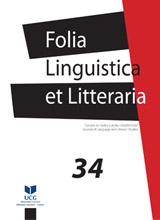Interkulturna kompetencija srednjoškolskih učenika engleskog jezika u Srbiji
INTERCULTURAL COMPETENCE IN SECONDARY-SCHOOL EFL STUDENTS IN SERBIA
Author(s): Radmila BodričSubject(s): Foreign languages learning, Sociolinguistics
Published by: Filološki fakultet, Nikšić
Keywords: intercultural communicative competence; intercultural encounters; secondary school; EFL; quantitative research; intercultural perspective
Summary/Abstract: Language competence alone is not sufficient for successful intercultural encounters and communication in diverse cultural contexts. These also require intercultural communicative competence, which represents a synergy of positive intercultural attitudes, knowledge and skills. Developing intercultural competences is a lifelong process and its intensity and dynamics are subject to constant change, as is the case with cultures themselves. The aim of contemporary intercultural education is to build an intercultural identity, namely a person’s critical intercultural awareness, sensitivity and intercultural resourcefulness. Intercultural education is based on the fundamental tenets of human dignity and equality, the capacity to comprehend, accept and to respect cultural differences. The aim of this paper is to determine whether (and to what extent) secondary-school EFL students in Serbia possess intercultural competences and sensitivity, as well as whether there are significant differences in intercultural competences depending on gender and the length of learning English. A quantitative study has been carried out with the use of a questionnaire as a research instrument. The results of the study have shown that the students possess developed intercultural competences, sensitivity and awareness of the fact that accepting cultural differences is a prerequisite for establishing successful intercultural links. Research of this type is significant because the students’ intercultural perspective is an important factor in determining the direction taken by their lives, work and further specialization in a multicultural society.
Journal: Folia Linguistica et Litteraria
- Issue Year: 2021
- Issue No: 34
- Page Range: 311-328
- Page Count: 18
- Language: Serbian

